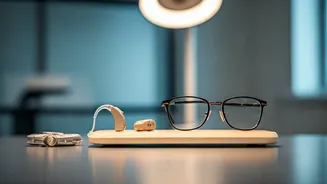Regular Health Checks
Regular check-ups are fundamental to sustaining good health as you get older, particularly when it comes to vision and hearing. Scheduling eye exams can
help detect conditions like glaucoma or cataracts early, when treatment is most effective. Similarly, hearing tests identify hearing loss, enabling timely interventions like hearing aids. These proactive measures allow for prompt management of any issues, thus preserving the quality of life. For instance, annual check-ups should be an integral part of maintaining your health.
Safe Home Environment
Creating a safe living space can significantly reduce the risk of falls and injuries. Start by removing tripping hazards such as loose rugs and electrical cords. Ensure good lighting throughout the house, especially in hallways, stairways, and bathrooms. Install grab bars in the bathroom near the toilet and shower to provide support. Consider adding non-slip mats in areas prone to moisture. These simple modifications can make a significant difference in preventing accidents and boosting confidence in mobility. By applying these methods, you are proactively taking steps to safeguard your health.
Balance Exercises Daily
Regular balance exercises are important for improving stability and preventing falls. Simple exercises can be incorporated into your daily routine. Try standing on one foot for a short period, holding onto a chair for support if needed. Another option is walking heel-to-toe, mimicking a tightrope walk. Tai chi and yoga are also excellent for improving balance and flexibility. Consistency is key; aim to perform these exercises daily to see the most benefits. Taking such actions will greatly improve your quality of life.
Footwear Matters Greatly
The shoes you wear can greatly affect your balance and stability. Opt for footwear with good support and non-slip soles. Avoid wearing shoes with high heels or loose-fitting designs, as these can increase the risk of falls. The ideal choice includes supportive shoes with a firm sole that fit properly. If you have foot problems or difficulty with balance, consult a podiatrist for personalized footwear recommendations. Making smart choices when it comes to footwear can make a huge impact on your mobility and stability.
Strengthen Core Muscles
Strengthening your core and leg muscles plays a crucial role in maintaining balance. Incorporate exercises that target these muscle groups into your routine. Exercises like squats and leg raises can build strength in the legs. Work on core-strengthening activities such as planks. These exercises help improve your body's ability to maintain an upright posture. A strong core provides a solid foundation for all movements, enhancing stability. By consistently exercising these vital areas, you're improving your overall health and well-being.
Vitamin D and Calcium
Maintaining adequate levels of Vitamin D and calcium is essential for bone health. Strong bones are necessary for maintaining good balance and preventing fractures. Consider Vitamin D supplementation after discussing it with your doctor. Include calcium-rich foods in your diet, such as dairy products, leafy green vegetables, and fortified foods. Adequate intake of these nutrients promotes bone density, reducing the risk of falls and related injuries. This will further improve your physical state, allowing for a better life overall.





















